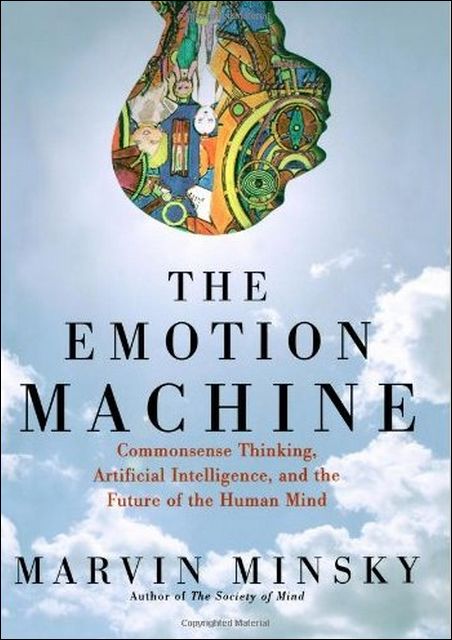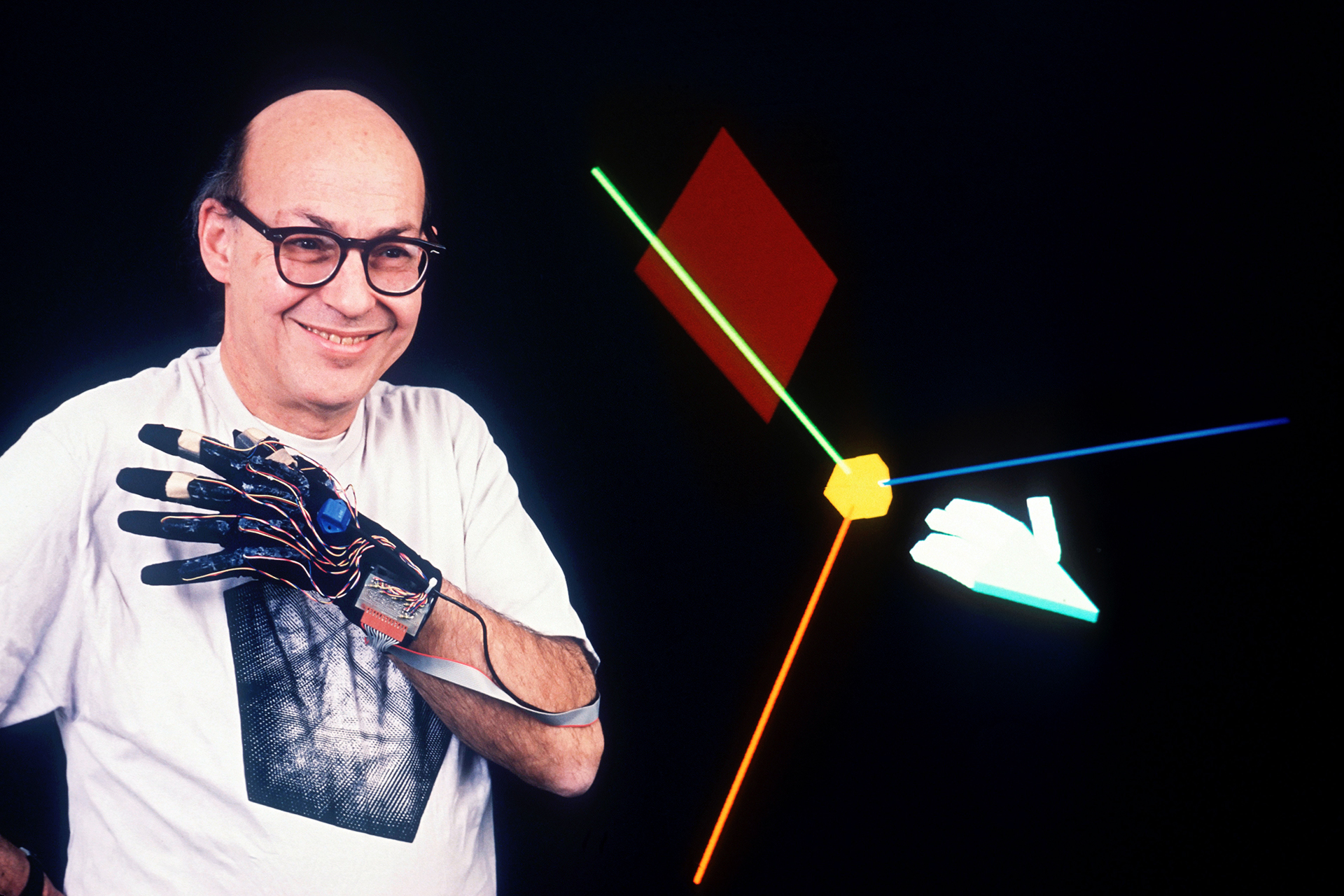Marvin Minsky's “The Emotion Machine”: Chapter 1. Love
- Transfer

Oh life is a great song cycle, TheMany consider it absurd to talk about a person as a kind of machine - why do we occasionally hear statements like this:
interweaving of accidents,
And love is that which is always true,
And I am Maria Romanian.
- Dorothy Parker.
Citizen: Well, of course, cars are good for us. We can let them stack giant columns of numbers or assemble cars in factories. But nothing mechanical can have real feelings, such as love.Nowadays, it is no longer surprising that machines are capable of performing logical operations, because the logic itself is based on transparent, simple rules - just those that a computer can easily operate with. However, Love, some will say, cannot be explained in these simple terms, you should not even try. Recall the words of Pablo Neruda:
Love should be such,What is love and how does it work? Do we need to try to understand it, or maybe we should take such poetry as a hint of our unwillingness to understand the issue? Let’s take a look at our friend Charles’s attempt to describe his recent hobby:
Attracting and comprehensive,
Exceptional and terrifying,
Revered and yet mournful,
Blossoming like stars,
And immeasurable - like a kiss.
- From the Extravagario.
Charles: I just fell in love with a wonderful person. It’s hard for me to think about anything other than her. My beloved is incredibly perfect - indescribable beauty, impeccable character, unimaginable mind. There is nothing that I would not do for her.
On a superficial level, these statements seem positive; they consist entirely of superlatives. But this is strange: most of these laudatory phrases contain such syllables as “not” and “without”, but describe not the subject of the speaker’s passion, but himself!
Wonderful, indescribable ...And all these things are positive for our comrade. They make him feel cheerful and productive, facilitate his despondency and loneliness. But what if these pleasant emotions were triggered by attempts to defend oneself from thoughts of what his girlfriend was saying:
- (I can’t understand what exactly attracts me to her)
It is difficult to think of anything but her.
- (Most of my mind stopped working)
Incredibly perfect, unimaginable ...
- ( An intelligent person will not believe these things) An
impeccable character ...
- (I refused critical thinking)
There is nothing that I would not do for her.
- (I gave up most of my permanent goals)
Celia: Oh Charles, a woman has needs. She wants to be loved, desired, honored, popular, she needs to be looked after and sought for, she wants flattery and affection. She needs sympathy, affection and devotion, understanding and tenderness, passion, adoration and admiration - am I really asking too much, Charles?Thus, love can make us ignore most defects and shortcomings, and take flaws for beauty - even, according to Shakespeare, when we are fully aware of their reality:
When love swears that it is made of truth,A person has a penchant for self-deception - not only when it comes to personal life, but also in working with abstract ideas. Even there, we often have conflicting, diverging views on the problem - cognitive dissonance. Recall the words of Richard Feynman:
I believe it, although I see it - it lies;
So I pretend to be the most naive young man,
That the falsities and forgery of the world does not keep records.
Believing in vain that I seemed young to her,
And knowing that the light of youth has lived by me,
With a smile I praise her deception,
Love has been exchanged for barren peace.
But what is she lying, what is young?
And I repeat to her that I’m not at all old?
Love knows how to flatter better than anyone,
But does not like to remember about age.
I will lie with love and lie side by side with her,
And together we will become blind to the flaws of our past days.
- Sonnet 138.
It was at the beginning, the idea seemed so obvious to me that I fell in love with it. Falling in love with an idea, like a woman, is possible only insofar as we do not know enough about her to see her flaws. They will become apparent later - when love is already strong enough so that they do not interfere with it. So, despite all the difficulties, my youthful enthusiasm forced me to continue to love.In fact, what exactly does a lover love? It would seem that this word should fully describe the subject of your adoration; but if your goal is to prolong the pleasure resulting from the suppression of doubt, you are in love with love itself, and nothing more.
- From a lecture on the occasion of receiving the Nobel Prize, 1966
Citizen: your definition of love given above describes only temporary adoration - lust and extravagant attraction. It does not include many of the concepts that we usually have in mind when speaking this word - such as fidelity and tenderness, affection, trust and empathy.And indeed, as these short-term attachments fade, they can be replaced by more reliable relationships, within which we give priority to the interests of the partner, and not to our own.
Love (n.) - an internal state or disposition towards a person (resulting from the recognition of attractive qualities, instincts of natural origin or sympathy), which manifests itself in concern for the well-being of the object, along with the pleasure of his / her presence and the need for him / her encouragement; tenderness, affection.However, even this concept of love seems too narrow, since Love is a kind of "word-chest", which also includes concepts such as:
- Oxford English Dictionary
- Parent's love for the child.
- Child's love for parents and friends.
- Friendship for life.
- Attachment of group members to the groups themselves or their leaders.
Also, by the word "love" we can mean our attachment to objects, events and beliefs:
- A convert to dogma or scripture of his faith.
- Fidelity of the patriot to the state or nation.
- Scientist's passion for finding new truths.
- Honoring evidence by a mathematician.
Thus, we apply the concept of love to the things that we value, which we desire, or to those that give us pleasure. We apply it both to sudden and fleeting ties, and to those that only strengthen over the years. Some of them occupy a tiny space in the human mind, others seem to permeate all life.
But why do we "put" so different things into this "word-chest"? The same applies to our other “emotional” concepts; each of them defines a huge set of diverse mental states. So, Anger can change our perception, turning innocent gestures into threats; it also changes our reactions, leading to a direct collision with a visible danger. Fear also affects how we react, but, on the contrary, makes us retreat to dangers (including those that can give us too much pleasure).
Returning to the meaning of “Love” - it seems that all these concepts are united by one thing, namely, each of them in a certain way affects the way we think :
When a person you know well falls in love, a new one appears in his place, another person thinks differently, with excellent goals and priorities. As if someone had switched the lever and another program started.This book is mainly filled with ideas about what processes in the human brain are reflected by such a radical change in thought processes and perceptions.
Thank you for translating Savva Sumin, who responded to my call in the “previous chapter”. Who wants to help with the translation - write in a personal email or e-mail magisterludi2016@yandex.ru
By the way, we launched the translation of another cool book - “The Dream Machine: The History of the Computer Revolution” .
Table of Contents for The Emotion Machine
Introduction
Chapter 3. FROM PAIN TO SUFFERING
Chapter 4. CONSCIOUSNESS
Chapter 5. LEVELS OF MENTAL ACTIVITIES
Chapter 6. COMMON SENSE
Chapter 7. Thinking.
Chapter 8. Resourcefulness.
Chapter 9. The Self.
Chapter 1. Falling in Love
Chapter 2. ATTACHMENTS AND GOALS The Love
Of The Sea Of Mental Mysteries
Moods and Emotions
Infant Emotions
Seeing a Mind as a Cloud of Resources
Adult Emotions
Emotion Cascades
Questions
Of The Sea Of Mental Mysteries
Moods and Emotions
Infant Emotions
Seeing a Mind as a Cloud of Resources
Adult Emotions
Emotion Cascades
Questions
Chapter 3. FROM PAIN TO SUFFERING
Chapter 4. CONSCIOUSNESS
Chapter 5. LEVELS OF MENTAL ACTIVITIES
Chapter 6. COMMON SENSE
Chapter 7. Thinking.
Chapter 8. Resourcefulness.
Chapter 9. The Self.
about the author

Marvin Lee Minsky (born Marvin Lee Minsky; August 9, 1927 - January 24, 2016) is an American scientist in the field of artificial intelligence, co-founder of the Laboratory of Artificial Intelligence at the Massachusetts Institute of Technology. [ Wikipedia ]
Interesting facts:
- Minsky was friends with the critic Harold Bloom of Yale University, who spoke of him as nothing more than "the sinister Marvin of Minsky."
- Isaac Asimov described Minsky as one of two people who are smarter than himself; the second, in his opinion, was Karl Sagan.
- Marvin is a robot with artificial intelligence from the Douglas Adams cycle of hitchhikers in the galaxy and the movie Hitchhiker's Guide to the Galaxy (film).
- Minsky has a contract to freeze his brain after death in order to be "resurrected" in the future.
- In honor of Minsky, the dog is named the main character in the movie Tron: Legacy. [ Wikipedia ]
